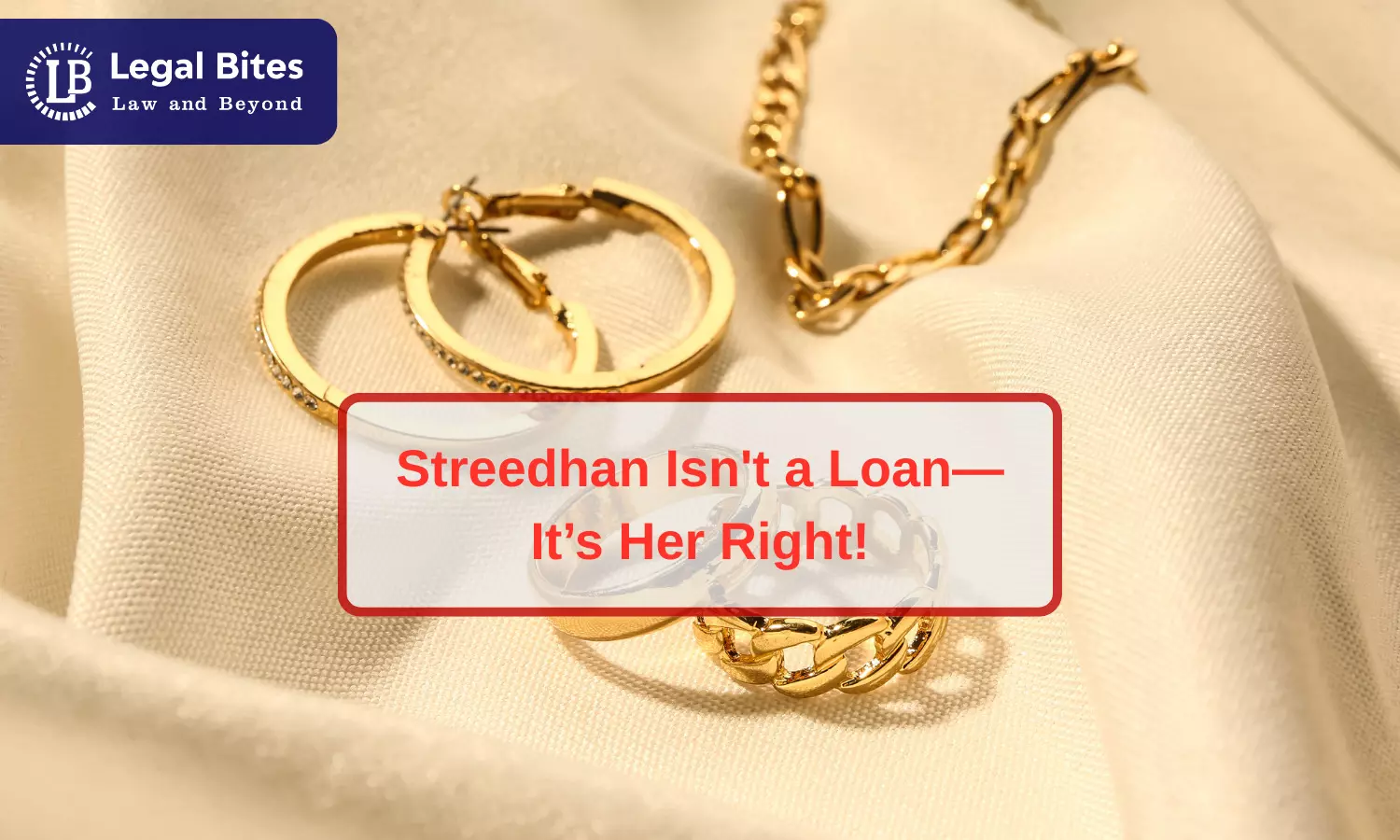Can a Wife Be Denied Return of Her Gold Without Strict Documentary Proof?
The judgment confirms streedhan is solely the woman's property and cannot be held or misused by in-laws under the guise of family arrangements.

In Indian matrimonial settings, gold ornaments gifted to the bride by her parents, husband, and relatives are not only customary but also hold significant symbolic and financial value. However, disputes often arise when the marriage breaks down or the bride is widowed, especially when such ornaments are in the custody of her in-laws.
The Kerala High Court, in its recent judgment in Prasad & Anr. v. Greeshma (2025:KER:49786), addressed the evidentiary challenges faced by women in seeking the return of their gold ornaments. The ruling reaffirms that courts must adopt a pragmatic approach and not demand strict documentary proof in such sensitive domestic disputes.
Factual Background of the Case
The matrimonial appeal arose from a case filed by Greeshma, a young widow, seeking the return of 81 sovereigns of gold ornaments which she claimed were entrusted to her in-laws after her marriage to Pradeep, who was working abroad and tragically died by suicide within a year of their wedding.
Her in-laws, Prasad (brother-in-law) and Padmavathi (mother-in-law), denied any such entrustment, claiming either that she retained the jewellery herself or that it was not given at all. The Family Court in Tirur had directed the in-laws to return 53 sovereigns of gold. The in-laws appealed, arguing a lack of evidence, particularly strict proof such as bills or witnesses.
Issue
The key question was:
- Can a wife be denied return of her gold ornaments merely because she does not possess strict documentary proof or witness testimony of entrustment?
The appellants urged the court to set aside the Family Court’s decision, citing lack of cogent evidence and challenging the financial capacity of the bride’s father to gift such a large amount of gold.
Judicial Reasoning and Analysis
The Division Bench comprising Justice Devan Ramachandran and Justice M.B. Snehalatha upheld the Family Court’s findings partially, emphasising the need for a realistic and empathetic approach when dealing with claims involving women and matrimonial gold ornaments.
1. Nature of Matrimonial Entrustment
The Court acknowledged that:
- In Indian families, jewellery is commonly entrusted to the mother-in-law or family elders for safekeeping.
- Such transactions occur within the four walls of the home and rarely involve formal receipts or third-party witnesses.
- Newly married women cannot be expected to create documentation or demand acknowledgements for handing over their own wedding jewellery.
2. Standard of Proof: Civil vs. Criminal
The Court clarified that unlike in criminal cases, civil disputes operate on the "preponderance of probabilities", not proof beyond reasonable doubt. Therefore, the Court must weigh which version is more likely given the circumstances.
- The bride's photographs in full bridal jewellery (Ext. P3 series) and purchase receipts (Ext. P2 series) from Malabar Gold & Diamonds the day before the wedding supported her claim.
- The testimonies of PW1 (the petitioner) and PW2 corroborated each other and were not materially discredited.
- The defendants failed to provide any consistent or plausible alternative explanation for the 53 sovereigns of gold.
3. Failure to Testify by Key Respondent
While Prasad (RW1) testified that he resided separately and denied entrustment, the mother-in-law Padmavathi, who was directly accused of holding the jewellery, chose not to testify, weakening the defence.
4. Arguments Rejected by the Court
The Court dismissed the argument that Greeshma’s father lacked the financial means to gift such gold, noting:
- Purchase bills and photographs substantiated the claim of 53 sovereigns.
- The defence’s reliance on a gold loan taken by her father on a different item (24g bangle) was irrelevant and unrelated.
Final Judgment
The Kerala High Court ruled:
- Prasad (brother-in-law) was not liable as he resided separately and there was no evidence of his involvement.
- Padmavathi (mother-in-law) was directed to return 53 sovereigns of gold ornaments to Greeshma.
- The Court also ordered costs to be paid by Padmavathi.
Key Highlights of the Decision
Justice Devan Ramachandran and Justice M.B. Snehalatha observed:
In most Indian households the entrustment of gold ornaments by a bride to her husband or in-laws occurs in a setting of familial trust within the four walls of the matrimonial home. A newly wedded woman would not be in a position to demand receipts or independent witnesses while handing over the jewellery to the husband or in-laws. Due to the domestic and informal nature of such transactions, she would not be in a position to produce documents or independent witnesses to prove entrustment.
The woman being a family member, cannot be expected to anticipate a future legal dispute and create documentary evidence in a household where she is expected to conform, trust and remain silent, especially in the early stage of her marriage.
Therefore, if any dispute arises at a later stage, the woman is placed in a practically difficult position of proving the entrustment of her own valuables. In such circumstances, strict proof beyond a reasonable doubt as is required in criminal law would lead to injustice, and therefore the Court has to adopt a pragmatic approach and decide the issue of entrustment on the principle of preponderance of probabilities.
Legal and Social Significance of the Judgment
1. Empathetic Approach in Matrimonial Disputes
The judgment stands as a crucial precedent in recognising that legal formalism cannot override the lived realities of women in domestic settings. Entrustment of valuables within the family often lacks formalities, and courts must not deny relief solely due to the absence of strict documentation.
2. Empowering Women to Seek Recovery
The ruling gives confidence to aggrieved women, especially widows or estranged wives, that they can pursue rightful claims without fearing the impossible burden of producing written acknowledgements or third-party testimonies.
3. Recognition of Domestic Power Dynamics
The Court aptly appreciated the asymmetry of power and agency within households, where women often silently comply with familial norms, even at the cost of their financial security.
Conclusion
Kerala High Court's decision in Prasad & Anr. v. Greeshma highlights a progressive interpretation of civil evidentiary standards in matrimonial disputes. It sends a strong message that justice cannot be denied on the altar of procedural rigidity, especially when it concerns the rights of women to reclaim their assets.
In a legal culture often criticised for burdening victims with unrealistic expectations of evidence, this ruling strikes a balanced and compassionate chord, ensuring that the wheels of justice do not crush the very people they are meant to protect.

